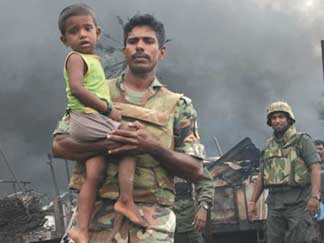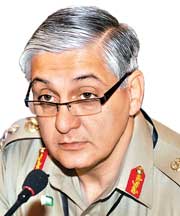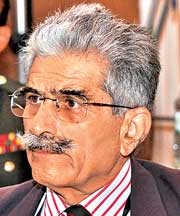
Sri Lankan experience proves nothing is impossible
By Shanika SRIYANANDA
|

The greatest humanitarian mission in progress
|

Brigadier M. Umair |

General Ashok Metha |
The international seminar - Defeating terrorism - the Sri Lankan
experience- organised by the Sri Lanka Army (SLA) was a genuine effort
and a fine platform to give an overall picture to the entire world how
the mighty lions of the Sri Lankan Security Forces defeated the world's
ruthless Tigers - LTTE - two years ago.
It is a complete package for one to understand the vital components -
committed and firm political leadership, adaptation of correct military
strategy in attacking terrorists, the correct selection of the military
officials to lead the military, rescuing displaced people used as a
human shield by the LTTE and implementation of three Rs - resettlement,
rehabilitation and reconciliation - wiping out the scourge of terrorism
in Sri Lanka.
As the Army Chief Lt. General Jagath Jayasuriya said Sri Lanka and
its military don't have anything to hide about how they fought to defeat
terrorism. The three day seminar proved there is 'nothing to hide' but
there is a success story, which was achieved through sheer dedication,
commitment and genuine efforts to usher in a peaceful era, to teach the
whole world.
"It is a saga to be shared with the world. It is our story of
courage, valour and glory of compassion, humanity and joy of peace,
freedom and democracy. Above all it is the story of epic political
resolve and the will to deliver a nation from the grip of terrorism,
wherein strong political will and national support was key to victory.
Victory for Sri Lanka came with many sacrifices", Lt. Gen. Jayasuriya
said in his welcome address.
He said Sri Lankan approach to counter terrorism has been unique and
a paradigm shift from the traditional approach to counter terrorism. "
Most importantly I hope it will bring out the intricacies of dealing
with humanitarian issues which is sine-qua-non and the complexities of
fighting non-state actors within the obligations of the Geneva
Conventions, all of which we were able to overcome with much
sacrifices", he said.
Over 80 top military officials, representing 41 countries, including
China, Russia, India, Pakistan, Ukraine and Bangladesh took part in the
sessions, where they were given freedom to throw any question to clarify
doubts with Sri Lankan military and counter terrorism experts as well as
those who are involved in resettlement, rehabilitation and humanitarian
de-mining in the North and East.
Speaking on 'Challenges and Prospects of Counter Terrorism', External
Affairs Minister Prof. G.L. Peiris said the SLA not only defeated LTTE
terrorism, but also assisted the Tamil civilians to restart their
lives." The victory against the LTTE was not by conventional war and it
was different from an orthodox military approach. Sri Lanka had to fight
for a different cause to save lives of thousands of besieged Tamil
civilians, for whom the LTTE claimed it was fighting for. It was a war
of strategy, perceptions, humanitarian concerns, survival and
psychological orientations. The extent of psychological penetration into
civilians by LTTE for years as well as the fear-psychosis that gripped
the northern society were evident in all sectors, including little
children in the area", he said.
The counter terrorism experts Rohan Gunaratne, Lt. Col. Suresh Sallay
and Dr. Ahmed S. Hashim explained the future challenges in countering
LTTE activities internationally.
Lt. Col. Sallay speaking on the evolution of LTTE and international
network said that today the same Front Organisations together with pro
LTTE activists and less than 15% of the radicalised segments of Diaspora
population who were largely responsible for destabilising the island
nation and helped sustain the LTTE terrorist campaign over many years,
are still engaged in carrying out the same activities as they did in the
past in the pretext of safeguarding the rights of Tamils and using the
human rights banner.
"These international developments has not only created a negative
impact on ongoing reconciliation, rehabilitation and development work in
the North and East but also may affect the relationship between the
Sinhalese and Tamil communities in the country," he said.
According to Lt. Col. Sallay the sophistication of the LTTE and its
impact on Sri Lanka and the outside world should serve as a lesson to
all Governments facing terrorism today including the countries those who
are wittingly or unwittingly permitting their soil to be used to nurture
or condone terrorism thus leaving us a fearful challenge for tomorrow.
The field commanders - Maj. Generals Jagath Dias, Nandana Udawatta.
Prasanna Silva, Shavendra Silva and Chagie Gallage shared their
experience in vanquishing the LTTE domination from the East to North by
explaining the tactical approaches adopted in their operations.
They said that after fighting one of the world's most ruthless and
dangerous terrorist organisations for over three decades, the SLA has
acquired immense knowledge, experience and skills in combating terrorism
and insurgency. The final and decisive years of the conflict saw the
Army develop into an adaptive, flexible and professional fighting
outfit, capable of executing innovative counter insurgency operations
and counter terrorists warfare concepts. The most effective method was
the adaptation of the small group concept in military operations.
The field commanders explained how the LTTE used the displaced
civilians as a human shield by the LTTE and the Government declared No
Fire Zones for the safety of the civilians who were used as battlefields
by keeping them as hostages. " The LTTE deployed them as a human shield
by placing war like materials in the civilian held zones, The LTTE's
defensive positions and bunkers were observed to be among make-shift
shelters of the civilians in the NFZs".
They revealed that the LTTE used the Udararkadu hospital, the
temporary hospital at Valipunam school and ICRC office at Udararkadu,
the UN communication hub in Valipunam and the UN humanitarian mission
safe houses in Puthukudiyirippu.
They explained how the LTTE disregarded humanity by killing the
fleeing civilians and also carrying out suicide attacks on fleeing
civilians. On February 2009, the LTTE carried out a desperate suicide
attack on the 58 division IDP receiving centre at Puliyanpokkanai
killing troops and civilians including children and an elderly people
who came to the army controlled area. The terrorists fired at civilians
who were trying to escape from the LTTE domination at Udayarkattukulam
and killed 19 civilians and injured 75. Amidst the LTTE's atrocities, to
keep its human shield further for their survival the government declared
the fourth NFZ at Puthumathalan, where the LTTE moved its heavy
artillery and mortars into the zone.
The field commanders explained the availability of real time
battlefield information systems like UAVs, radar, real time satellite
images, helped conduct effective tactical operations to minimise
civilian casualties while causing damage to the LTTE. The high quality
and accurate intelligence network of the Army, Navy and Air Force also
helped identify the correct enemy targets.
On the topic of force multipliers in counter terrorism, Brig. N.A.
Dharmaratne spoke about operations behind enemy lines. Brig. I.P.
Ranasinghe explained on armour support, Brig. N.A.P.C. Napagoda on
artillery support, Brig. L.N. Wickramasuriya on the role of engineers in
the battlefield, Brig. K.R.P Rowel on signals, Commodore N. Rozairo
explained the Sri Lanka Navy's role while Air Vice Marshal K.A.
Gunatilake explained the role of the Air Force in assisting the Army to
defeat the LTTE.
The key military officials of the supportive services also explained
their support in the battle to defeat terrorism. Brig. H.D.W.
Kariyawasam and Brig. T.N. Jayasuriya explained about logistic
support,Maj. Gen. Sanjeewa Munasinghe about medical support, Brig. R.A.
Nugera on training.
Humanitarian mission
The third day of the seminar was devoted the post conflict
'humanitarian operation', where the Government was tasked to feed and
look after over 300,000 displaced civilians and 11,664 ex-LTTE cadres
including over 500 child soldiers.
The session gave an overall view on how successfully the Government
accomplished the challenge by resettling over 90 percent of the
displaced civilians and rehabilitating nearly 7,000 ex-LTTE cadres
within a year and a half of ending the war against terrorism.
Commissioner General of Rehabilitation Maj. Gen Sudantha Ranasinghe
said the government had spent over Rs.1.8 billion in rehabilitating
ex-LTTE cadres in the first year of the rehabilitation and revealed that
over 11,664 ex-cadres surrendered to the military during the final
months of the end battle and over 75 percent of the ex- LTTE cadres have
reintegrated back into the society within a year and half of ending the
final battle in May 2009,
"There 4,301 ex-LTTEers are now undergoing rehabilitation in State
run rehabilitation centres.
"The Government had spent Rs 150 million per month in the first year
and reduced to Rs.64.5 million per month with reintegrating of
rehabilitated ex cadres back to the society," he said. He also said the
Government has spent nearly Rs. 774 million in the second year of
rehabilitation process.
Explaining the resettlement process Brig Hapuarachchi said the new
concept, the three Rs-resettlement, reconstruction and reconciliation,
introduced by the Government immediately after the end of the
humanitarian operation, to rescue over 300,000 people used as a human
shield by the LTTE, helped win the hearts and minds of the people in the
north.
He said the program became a success due to the high discipline of
the soldiers and also their commitment toward the three Rs in the post
conflict era.
Brig. Wijeratne said it was a huge challenge for the Army to clear
the mine laden lands in the North, which were mostly the former
battlefields of the LTTE, for a speedy return and resettlement of the
displaced people.
"Over 1.6 million landmines have been laid in Sri Lanka of which are
366,870 are cleared upto now. There are 1.23 million mines still to be
cleared. By April 2011 over 400 sqkms are yet contaminated by mines and
explosive remanents of war", he said, adding that the total area
allocated to the Army de-mining unit was 1556 sqms and the 1,500 army
de-miners have cleared 1,285 sqms which is approximately 83 percent of
the total area entrusted.
Several military top brass who spoke to the Sunday Observer said the
seminar was very useful them to understand Sri Lanka's tactical,
strategical and political aspects of defeating the LTTE terrorists.
Brigadier M. Umair from Pakistan said the well organised seminar
provided an opportunity for not only the Pakistan military but also the
other top military officers from other countries to learn from the Sri
Lankan experience on defeating terrorists tactically.
"Terrorism is not only a problem of one country it is a global
problem and the seminar gave a wider aspects of tackling terrorism. No
military can survive without the support of the people and Sri Lankan
people backed the military till the end of its military operation. The
Sri Lankan experience is a case study which reiterates the fact that no
army can act in isolation. Because of the perfect harmony between the
Government and the armed forces, and because the Sri Lankan nation stood
by the armed forces, victory was possible. There were many aspects of
terrorism that were discussed. Beyond any doubt, this is a good learning
experience for the whole South Asia", he said.
"This event is a very successful and memorable and also a very useful
event for other countries. Sri Lanka's lead in defeating terrorism is a
good lesson for all. Meanwhile the interaction with Sri Lanka's senior
military officers at the seminar as well as outside the seminar is very
interesting', said Ahmed Nijam, Brigadier General from Maldivian Army.
The Former chief of the Indian Peace Keeping Force in Sri Lanka
General Ashok Metha said Sri Lanka's experience on defeating terrorism
has proved that nothing is impossible for the Sri Lanka's Army assisted
by the Navy and Air Force. "We all thought the LTTE was invincible and
even the LTTE thought they were invincible but the Sri Lankan military
did it", he said.
"The seminar is a clear evidence that Sri Lankan military has
graduated to a fine professional force. It is a proof that the Sri
Lankan Army was not shy of the LTTE or any other threat now. The seminar
was a fine platform for lots of countries to learn about tactical,
operational and political expertise of Sri Lanka", he said.
Gen. Metha said according to his view, Sri Lankan Army stands tall
and its political leadership stands even taller and the country is more
confident on how it defeated the LTTE." It is time to look forward for
reconciliation", he said.
Central Bank Governor Dr. Ajith Nivard Cabraal said Sri Lanka had
only spent US $ 5.5 billion, which is less than the powerful countries
spent on training their military personnel, to annihilate the LTTE
terrorism during 2006 to 2009 period.
"It was an investment in peace.", he said adding that money went to
strengthen the security forces, to buy equipment, and for the actual
military operations that led to the Tigers' defeat in May 2009, ending
the 30-year ethnic war.
He said the amount the US spent on training military alone is US $ 39
billion. When one compares that with the entire Sri Lankan cost for
ending terrorism is which just US $ 5.5 billion, it is only about 14
percent of the training cost of other countries spent on their
respective wars.
President's Secretary Lalith Weeratunge speaking on the theme of Sri
Lanka becoming the 'Wonder of Asia' said the programs designed under the
Mahinda Chinthana policy brought peace to the country and the policies
implemented under the extended version of the Mahinda Chinthanaya
Idiridekama will bring economic prosperity to not only to the North and
East but also to the entire country.
He said the Government had invested over Rs. 295 billion to develop
the North under the Uthuru Wasanthaya program to uplift the lives of the
Tamils who were battered under the LTTE and also develop their areas.
The former Mullaithivu Government Agent Emelda Sukumar, who asked a
few minutes to share her eight-year long experience under the LTTE
control said the Government had sent stocks of food, medicine and other
essential items to have a buffer stock during the final months of the
end battle against the LTTE, to facilitate the displaced civilians.
She said that she was threatened by former political wing leader P.
Thamilselvam not to send the monthly progress reports to the Government
as they would damage the image of the LTTE internationally.
Sukumar, who is presently the Jaffna GA, said the Government
continued to send cement stocks to the North knowing that the LTTE was
building bunkers using those cement stocks.
During the war period, even though then Security Forces Wanni
Commander and present Commander of the Army Lt General Jagath Jayasuriya
informed me to take the civilians out from uncleared area, I was unable
to do it as LTTE terrorists used civilians as human shield keeping them
as hostages, Sukumar said.
She said during war time in Mullaitivu also around 50 children were
entering University every year and it showed how the Government looked
after the people providing free education and free medical facilities.
Internationally acclaimed counter terrorism expert Prof. Gunaratne
who made the closing remarks of the three-day seminar said the success
story of the Sri Lankan military was proof that terrorism and insurgency
could be defeated.
He cited firm political leadership and close rapport with India also
contributed to defeat the LTTE. Prof Gunaratna elaborating on reasons
that were attributed to the defeat of LTTE terrorism said firstly, the
Army was able to detect hideouts and disrupt LTTE supply lines in
partnership with naval troops, secondly, the Army had the luxury of
attracting recruits to the Army on a large scale as the MoD was closely
interacting with the people at that stage. Thirdly, the clear and
determined will of the President of Sri Lanka, despite international
pressure, managed the international pressure in an excellent manner.
He highlighted the importance of maintaining the same close ties with
India in future.
Commenting on the need for a huge information network that reach out
to western capitals, he added that the LTTE with its satellite
information networks continue to spread disinformation against ground
realities in Sri Lanka. 'Biggest challenges that lie ahead include
emergence of mainstream Tamil political leadership and implementation of
a huge information infrastructure that set Sri Lankan case in correct
perspective.'
'Darusman report consists of direct data and statistics taken from
Tamilnet Website and other pro-LTTE resources. Now, though there is no
war, you need to fight with laptops in the corridors of power,' Prof
Gunaratna said.
Delivering the closing remarks at the seminar the Army Chief said
their efforts to give an opportunity for military experts worldwide to
share the Sri Lankan experience on defeating terrorism, was a success as
many have commended it as a very useful platform for them to learn from
Sri Lanka's experience.
When questioned about the alleged civilian deaths in the final phases
of the end battle he said there were no specific data to claim the
allegation but would carry out an investigation by the Army to probe the
allegation in future.
He denied the figure of 1,400 civilian deaths during that period
given by an expert at the seminar and said the video clip on shooting
surrendees by the soldiers was a doctored clip and there are no clear
details available on the video on the persons involved, place and day of
the killings.
|

